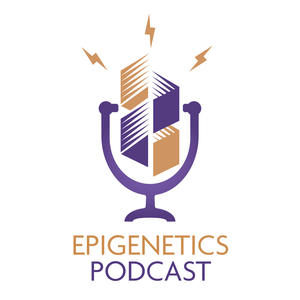The Impact of Chromatin Architecture on Alzheimer's and Parkinson's Disease (Ryan Corces)
In this episode of the Epigenetics Podcast, we talked with Ryan Corces from the Gladstone Institutes about his work on the impact of chromatin architecture on Alzheimer's and Parkinson's Disease.
The discussion begins in discussing he start of Dr. Corces research career and he shares his groundbreaking findings in acute myeloid leukemia (AML), demonstrating how mutations occurring in hematopoietic stem cells lead to the evolution of this disease. He emphasizes the pivotal role of epigenetic modifiers and how these insights steered his focus towards epigenetic research.
As the conversation progresses, Dr. Corces covers his transition to a postdoctoral role, emphasizing his collaborative work employing the ATAC-seq technique. He details how refinements to this protocol not only improved data quality but also paved the way for more expansive research within the fields of hematology and cancer genetics. Additionally, he discusses his excitement for developing new computational tools for single-cell analysis, aiming to address the critical challenge of distinguishing between cellular states effectively.
The episode also explores the fascinating intersection of Alzheimer’s and Parkinson’s diseases. Dr. Corces explains the rationale for studying both conditions simultaneously, shedding light on the shared and divergent pathological features that emerge in patients. He argues for the importance of understanding mixed pathologies, which reflect the reality for many individuals diagnosed with these neurodegenerative diseases.
References
Corces, M. R., Trevino, A. E., Hamilton, E. G., Greenside, P. G., Sinnott-Armstrong, N. A., Vesuna, S., Satpathy, A. T., Rubin, A. J., Montine, K. S., Wu, B., Kathiria, A., Cho, S. W., Mumbach, M. R., Carter, A. C., Kasowski, M., Orloff, L. A., Risca, V. I., Kundaje, A., Khavari, P. A., Montine, T. J., … Chang, H. Y. (2017). An improved ATAC-seq protocol reduces background and enables interrogation of frozen tissues. Nature methods, 14(10), 959–962. https://doi.org/10.1038/nmeth.4396
Corces, M. R., Granja, J. M., Shams, S., Louie, B. H., Seoane, J. A., Zhou, W., Silva, T. C., Groeneveld, C., Wong, C. K., Cho, S. W., Satpathy, A. T., Mumbach, M. R., Hoadley, K. A., Robertson, A. G., Sheffield, N. C., Felau, I., Castro, M. A. A., Berman, B. P., Staudt, L. M., Zenklusen, J. C., … Chang, H. Y. (2018). The chromatin accessibility landscape of primary human cancers. Science (New York, N.Y.), 362(6413), eaav1898. https://doi.org/10.1126/science.aav1898
Corces, M. R., Trevino, A. E., Hamilton, E. G., Greenside, P. G., Sinnott-Armstrong, N. A., Vesuna, S., Satpathy, A. T., Rubin, A. J., Montine, K. S., Wu, B., Kathiria, A., Cho, S. W., Mumbach, M. R., Carter, A. C., Kasowski, M., Orloff, L. A., Risca, V. I., Kundaje, A., Khavari, P. A., Montine, T. J., … Chang, H. Y. (2017). An improved ATAC-seq protocol reduces background and enables interrogation of frozen tissues. Nature methods, 14(10), 959–962. https://doi.org/10.1038/nmeth.4396
Sant, C., Mucke, L., & Corces, M. R. (2025). CHOIR improves significance-based detection of cell types and states from single-cell data. Nature genetics, 57(5), 1309–1319. https://doi.org/10.1038/s41588-025-02148-8
Related Episodes
ATAC-Seq, scATAC-Seq and Chromatin Dynamics in Single-Cells (Jason Buenrostro)
Multiple challenges of ATAC-Seq, Points to Consider (Yuan Xue)
Contact
Epigenetics Podcast on Mastodon
Epigenetics Podcast on Bluesky
Dr. Stefan Dillinger on LinkedIn
Active Motif on LinkedIn
Active Motif on Bluesky
Email:
[email protected]


